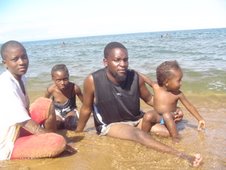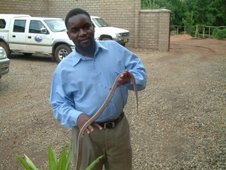(Sunday Times Dec 3, 2006)
Fighting HIV/Aids pandemic
It’s not a question of going public about one’s sero status.
by Hastings Maloya
Sex or sexual intercourse is a funny way of communication. It could be possible that someone in Nsanje has had an indirect sexual contact with someone in Mzuzu simply because one of them might have had sex with another person who, in the course of travel or life exploits, also had sex with another and eventually the latter had sex with the first one. In our communities, we might have had some sort of indirect sexual intercourse even with our closest friends. Funny it could sound but it is real.
The only good thing about this situation is that most of us do not know, neither do we probe as to who might have slept with who nor how we would personally find ourselves in line of the communicated persons. This silence and lack of probing is what has kept us all along. Otherwise if indeed we were to seriously go into the circus of probing or wanting to know, some of us could be very disappointed to note that we have sexually been associated with the people that we have all along thought we have avoided! This, therefore poses as the biggest challenge in the fight against HIV/Aids.
On Friday Malawi joined the international community in commemorating the World Aids Day under the theme stop Aids – keep the promise. Only if indeed we keep the promise, our fight against HIV/Aids will be very difficult to win.
Now this brings me to the subject of discussion today. The Aids pandemic has reached a crisis level and people are being encouraged to go for voluntary HIV testing so that they can make informed choices and be sure of looking after themselves. The question is, will it help if people that have been diagnosed with HIV or those that have Aids come out open to declare their sero status?
I think no.
History tells us that there have been epidemics and catastrophes associated with human development since time in memorial. Most of the catastrophes and calamities that human generations have faced have been natural and in most cases have been controlled or dealt with naturally, nevertheless recognition has gone to some dedicated individuals and institutions that have put in efforts and resources to help eliminate such tricky situations.
Disease has been one of the main problems that has troubled human development and continues to be the biggest challenge to date despite all efforts aimed at dealing away with it. Almost each generation has had its share of a particular troubling disease and maybe handed over to the next generation. Some of the diseases have proven to be a crisis and have cost lives of so many people. This is why examples of such diseases remain in our history books. However, life still goes on. Nature, sometimes, cannot easily be understood.
We are currently in the midst of yet another crisis. HIV/Aids is also slowly going into the history annals among the worst pandemics that have befallen man. Worse still, this crisis is in our midst at the time when we are struggling with other continually death-causing diseases like malaria, cholera and tuberculosis. But unlike the other diseases, which of course have caused a lot of deaths, the biggest challenge associated with HIV/Aids is the fact that there is no known cure and treatment.
Records indicate that the first case of HIV/AIDS in Malawi was discovered in 1985 and to date it is said that over 365,000 Malawians have died of the disease. The Joint UN Programme on AIDS (UNAIDS) puts the adult infection rate in Malawi at 16%. Other statistics indicate that Malawi has more than one million people estimated to be living with HIV, the virus that causes Aids. It is also scaring to accept reports that Malawi’s HIV/AIDS prevalence rate is almost twice the rate in sub-Saharan Africa. However, we have to accept these painful realities. HIV/AIDS, which is spread primarily through heterosexual sex, is now the leading cause of death in Malawi among people of ages 20-49.
According to available data, women account for more than half of adults estimated to be living with HIV/AIDS in Malawi. In 2003, over 83,000 children in Malawi were estimated to be living with HIV/AIDS and there were an estimated 500,000 Aids orphans. It is also said that HIV prevalence rates are almost twice as high in urban areas of Malawi compared to rural areas. The government acknowledges the daunting challenges that its support has been grossly inadequate and the condition of orphans is made worse by extreme poverty and the erosion of extended families.
The escalating numbers of orphans in the country as a result of HIV/Aids cannot be over emphasized. Malawi has, however, been praised for its humane and exemplary treatment of orphans despite the meagre resources.
But, wait a minute. To a certain extent, the Aids pandemic is not news. It is not news in the sense that today, it would be a very small percentage of Malawians that can stand up to claim that they have never heard anything about HIV/Aids. Over the past twenty years we have had numerous and series of campaigns, workshops and activities that have not only raised awareness and understanding but have also called for action among people.
Awareness initiatives have been done through different avenues including both the electronic and print the media, music, drama, and sports, religious and social gatherings. Controversies have also been noted in the cause of message delivery with different thoughts and agendas put forward. For example disagreements and counter arguments on whether we should promote the use of condoms among religious faithful have helped the cause of raising awareness as such controversies only strengthen debates among people thereby helping in disseminating messages among masses.
Studies have found that general awareness of HIV/AIDS in Malawi is very high. The only unfortunate thing is that statistics that come out of bodies and institutions trusted to handle issues of HIV/Aids do not give any hope. It shows that despite numerous messages and campaigns, there is little progress as the prevalence rate still escalates and deaths related to HIV/Aids are still high. No hope in sight.
The call for people to go for voluntary HIV testing and counseling is meant for us to be aware of our sero status and make an informed decision on how one would look after oneself and how to avoid infecting others in the spirit of keeping the promise. Because of the way the earlier messages about Aids were delivered, it is not easy for one to be told and accept his/her status. This is why the testing is also associated with counseling. In other words the only person that has been tested and counseled will ably accept the situation and indeed make an informed decision.
It is not easy for someone who would only know of the possibility of an infection through the assumption after realizing that a partner or an acquaintance has been diagnosed positive. It has always been said that fear for death is more painful than death itself. The moment people shall come out open about their sero status. We should accept that we shall create an environment of fear and disbelief. It will not help but rather create another catastrophe. Actually most people will not be encouraged to go for testing as they will have already made concluding assumptions following the disclosure by other people, especially if their status in society matter.
For those that made the wise decision to go for testing and are aware of their status surely, with good counseling, can indeed make wise decision about their lives. But please lets not put others in panic through wild assumptions. No need to announce during funerals – it wont help in the fight rather it will create fear and stigma. We cannot develop!
* Hastings Maloya works for Mulanje Mountain Conservation Trust but is writing in his personal capacity
I WELCOME you!
Dear Good People,
I warmly welcome you to my Blog and it is my profound hope that you will find it useful and worth the time you spend on it. On this Blog, I have posted some of the articles and pieces that I have writen just for record purposes and also for sharing. You might have read these articles in the papers but it could also be possible that you missed them.
Please be advised that these are my toughts and purely my opinions. You are free to comment on them and/or to critic them. I will appreciate any of your comments.
Thank You.
Hastings Maloya
+265 888864241 or +265 999950953
I warmly welcome you to my Blog and it is my profound hope that you will find it useful and worth the time you spend on it. On this Blog, I have posted some of the articles and pieces that I have writen just for record purposes and also for sharing. You might have read these articles in the papers but it could also be possible that you missed them.
Please be advised that these are my toughts and purely my opinions. You are free to comment on them and/or to critic them. I will appreciate any of your comments.
Thank You.
Hastings Maloya
+265 888864241 or +265 999950953
About Me
- Hastings A. MALOYA
- Mulanje, Southern Region, Malawi
- Is an experienced journalist, writer, specialist in development communications, public relations, publications, desktop publishing, information technology, photography, environmental education and rural development. Hastings Maloya is currently working as Programme Officer responsible for Environmental Education, Awareness and Communications for the Mulanje Mountain Conservation Trust (MMCT) since September 1, 2002. Hastings, comes from Tradional Authority Mabuka in Mulanje District, is an Adventist Christian, and has two daughters Eva and Eve.
Subscribe to:
Post Comments (Atom)








No comments:
Post a Comment